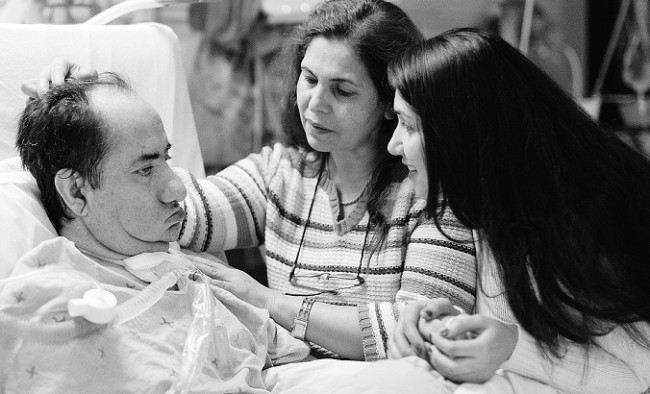
Hassan Rasouli is comforted by his wife, Parichehr Salasel, and daughter Mojgan Rasouli in Sunnybrook Hospital’s cardiac intensive care unit in Toronto. (Photo Tim Fraser For Postmedia News)
Should doctors or family members have the right to decide when to pull the plug on a disabled patient? The Supreme Court has decided doctors do not have the right.
In the Supreme Court Cuthbertson v. Rasouli, 2013 SCC 53 decision, some educated people believe the authorities, that is doctors and health care professionals, should be given the right to life.
The Globe and Mail opinion comes out clearly on the side of disability bigotry. The life of a person living with disability is not worth the cost to society. The Supreme Court did not agree with the doctors wish to end the life of this patient with a severe disability.
“The Supreme Court of Canada’s 5-2 decision in Rasouli is a clear victory for the family. Sadly, it is a loss for common sense and common humanity. It is also a blow against physician integrity and potentially damaging to the Canadian health-care system.” Globe and Mail

Arthur Schafer, director of the Centre for Professional and Applied Ethics at the University of Manitoba, says Supreme Court is wrong “a loss for common sense and common humanity” (Photo CBC)
Arthur Schaffer, in a Globe and Mail article, and the doctors in this Supreme Court decision are parroting a sophisticated version of the argument put forth to the German people by Adolph Hitler.
People with disabilities are unworthy of life and the costs of maintaining their lives. (See notation at the end for Dr. Schaffer’s bio)
That sounds extreme but it was Hitler and the Nationals Socialist Party who created the term “euthanasia” meaning “good death”.
“The term “euthanasia” (literally, “good death”) usually refers to the inducement of a painless death for a chronically or terminally ill individual who would otherwise suffer. In the Nazi context, however, “euthanasia” represented a euphemistic term for a clandestine murder program which targeted for systematic killing mentally and physically disabled patients living in institutional settings in Germany and German-annexed territories.”
“The so-called “Euthanasia” program was National Socialist Germany’s first program of mass murder, predating the genocide of European Jewry, which we call the Holocaust, by approximately two years…. It endeavored to eliminate what eugenicists and their supporters considered “life unworthy of life”: those individuals who–they believed–because of severe psychiatric, neurological, or physical disabilities represented at once a genetic and a financial burden upon German society and the state.” United States Holocaust Memorial Museum. “The Holocaust.”
Disability bigotry and discrimination exist in plain sight in Canadian culture and political society. Canada has no civil rights or human rights law that protects the disabled, unless they are capable of taking their cases to the Supreme Court. Luckily for the disabled, the Supreme Court.
ARCH Disability Law Centre Statement
ARCH Disability Law Centre is very pleased that today the Supreme Court of Canada affirmed that withdrawal of life support decisions must be resolved pursuant to the Health Care Consent Act, a law which sets out clear rules requiring consent with respect to treatment of incapable persons. The case of Cuthbertson v. Rasouli is about life and death decision-making and oversight of those decisions; subjects of fundamental importance to persons with disabilities.
In its majority decision, the Supreme Court laid out the process that the law requires when an incapable person is unable to provide consent or refusal in situations involving life support. Most importantly for persons with disabilities, the Court concluded that “treatment” under the Health Care Consent Act extends to withdrawal of life support, contrary to the arguments of the physician appellants.
ARCH Disability Law Centre and the Advocacy Centre for the Elderly, two of Ontario’s community legal clinics, intervened jointly in the case and argued that people with disabilities and the elderly are most likely to be disproportionately affected by the outcome of this case. We explained that ableism is an expression of systemic norms about people with disabilities that undermine their inherent personal worth. People with disabilities are often subject to affronts to their dignity and are denied choices in their lives. People with disabilities and the elderly are more likely to be poor and lacking in supports. Decisions to withdraw life-sustaining treatment that are not subject to the rule of law may rely on stereotypes about the quality of life and prospect for recovery of people with disabilities.
ARCH Disability Law Centre therefore welcomes the safeguard that has been strengthened by the Supreme Court for persons who are incapable of expressing their consent. Today’s decision reinforces the applicability of the Health Care Consent Act and the legal framework that it contains for resolving withdrawal of treatment disputes, namely a process before the Consent and Capacity Board that is accessible, expert, cost-efficient, and expedient. The Court has alleviated concerns that the Consent and Capacity Board might simply “rubber stamp” a physician’s decision by ruling that the Board must apply the highest standard of review to the decision of a substitute decision-maker, underscoring the critical nature of the interests at stake.
The process of referring these disputes to an accessible administrative tribunal is of particular importance for low-income people with disabilities and their substitute decision-makers. As the Chief Justice states in the decision, the legal and financial burden of requiring parties to apply to court for an injunction to prevent withdrawal of life support, as proposed by the physicians appellants, heightens the vulnerability of incapable patients.
Poverty hinders access to the courts for low-income older adults and persons with disabilities. The Health Care Consent Act’s central purposes and protections provide a meaningful process governing the withdrawal of life support treatment that respects the dignity and autonomy of older adults and persons with disabilities. ARCH applauds the Court’s acknowledgement of the importance of the right to bodily integrity and respect for patient autonomy.
———————-
Author – Prof. Arthur Schafer is director of the Centre for Professional and Applied Ethics at the University of Manitoba. schafer@cc.umanitoba.ca

You’ve completely missed the boat. This is not deccomment_IDing whether a person has the right to live with a disability. The case is surrounding a person whose brain has irreversibly been damaged where he can’t sustain life at its bare minimum. His lungs can no longer breath on their own and he will be in cardiopulmonary arrest if ventilation is achieved. This is entirely different from withdrawing active treatment where there is a chance for survival for any measure of enjoyable life. Your comparison to Hitler is ludicrous. The sad thing is, the majority of society is uneducated enough to automatically agree with you because you’ve made a comparison to the most hated human of the 20th century on virtually an unrelated topic.